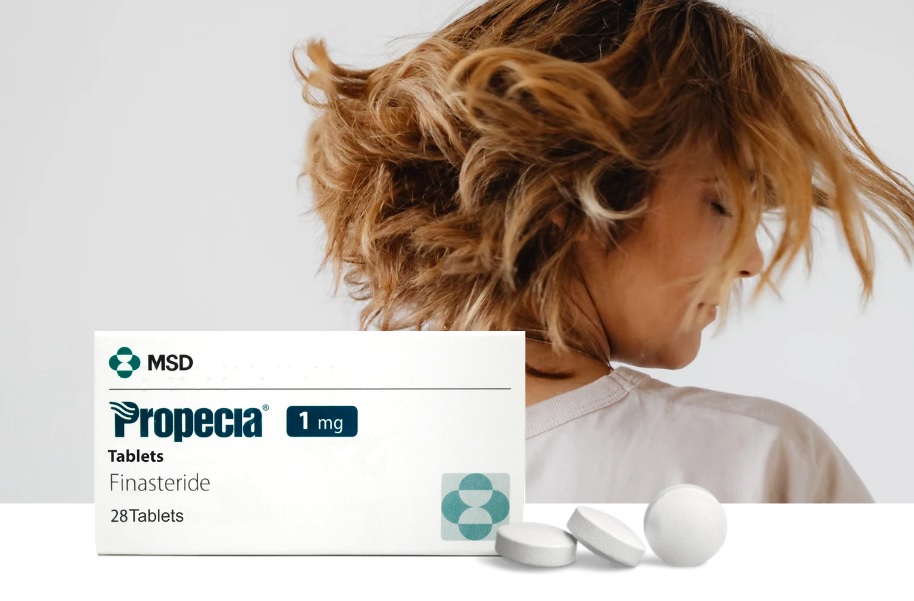
Can women take finasteride for hair loss, is it safe to take, and how effective is it?
Finasteride, sold under the brand names Proscar and Propecia, among many others, is a medication used to treat hair loss and benign prostatic hyperplasia in men. This treatment comes in pill/tablet form, and is taken orally.
Finasteride has long been associated as a treatment for male pattern baldness, but it can also be used to treat excessive hair growth in women and as a part of hormone therapy for transgender women.
In this article, we look at finasteride and its use for treating female hair loss.
Is finasteride medically approved for women?
Finasteride is not currently approved to treat any type of female hair loss condition, however, providers sometimes use finasteride for women off-label, especially for post-menopausal women when topical minoxidil and oral spironolactone have been ineffective.
Is it safe for women to take finasteride?
Like with any medications and drugs like finasteride, there are risks of negative side-effects. Men, as well as women, put themselves at risk by taking finasteride.
Some of the reported negative side-effects in women who took 2mg-5mg finasteride daily, were; a decreased libido, breast swelling and tenderness, headaches, irregular menstruation, dizziness, and increased body hair.
These side-effects do no occur in all women who take finasteride, but they are quite common.
Why is finasteride only medically approved for men?
It is important to be aware that finasteride is classified as category X in pregnancy. This means that finasteride is not suitable for women who are likely to become pregnant, as it can change the levels of the male hormones which may affect a male baby’s development.
Men who are on finasteride, are told to come off the drug if they are trying for a baby. Finasteride is not safe to take by men or women who are trying for a baby.
What is the best alternative to finasteride for female hair loss?
The most obvious safe alternative to finasteride for women would be multivitamin extract supplements. multivitamin extract supplements like HR23+ and Viviscal can be highly effective for hair loss prevention, as well as support the function of healthy hair growth.
Multivitamin extract supplements are also safe to take, giving no major negative side-effects, which means you can treat hair loss without ever having to compromise on your health and wellbeing.
What is the best medically approved hair loss treatment for women?
The only medicine approved by the United States Food and Drug Administration (FDA) to treat female pattern baldness is minoxidil. Branded as Regaine (or Rogaine in the States), minoxidil is a topical solution that has shown to help stump hair loss and aid in hair growth.
For women, the 2% solution foam or liquid is recommended. Minoxidil may help hair grow in about 1 in 4 or 5 of women, however results tend to be quite minimal, and there are risks of negative side-effects.
What is the best non-medical hair loss treatment for women?
Without being medically approved, it is difficult to define exactly what the best hair loss treatment is for women, however, going by reputation, results, and reviews, there are some treatments that standout from the pack.
HR23+ hair restoration supplement is widely regarded as the most effective non-medical oral treatment for hair loss in both men and women. It has shown to be effective in 9 out of 10 users.
Keratinocyte growth factor (KGF) topical serum has shown to be a good alternative to minoxidil. This powerful yet safe formula works at the root cause of hair loss, helping stump excessive shedding, and promote healthy hair growth.
Does finasteride work for female pattern baldness?
Trials have found finasteride 1 mg to be ineffective in postmenopausal women with female pattern hair loss at 12 months. However, higher doses of finasteride daily can be effective in cases of female pattern hair loss associated with hyperandrogenemia.
However, higher doses puts the patient at risk of negative side-effects.
Conclusion
Medications and supplements are the most common treatment for hair loss in women, with minoxidil and multivitamin extract supplements leading the way. Finasteride is not commonly taken by women as a treatment for hair loss, mainly because it is not medically approved to treat female hair loss.
There has not been any real evidence that finasteride can be effective for treating female hair loss, but there are still risks of negative side-effects. This makes finasteride a high risk treatment for women, with very little reward.
If you are experiencing female pattern baldness, then seek alternative treatments, preferably non-medical, and be sure to speak to your doctor or trichologist. It is unlikely that finasteride will do much to resolve your hair loss issue.

Leave a Reply